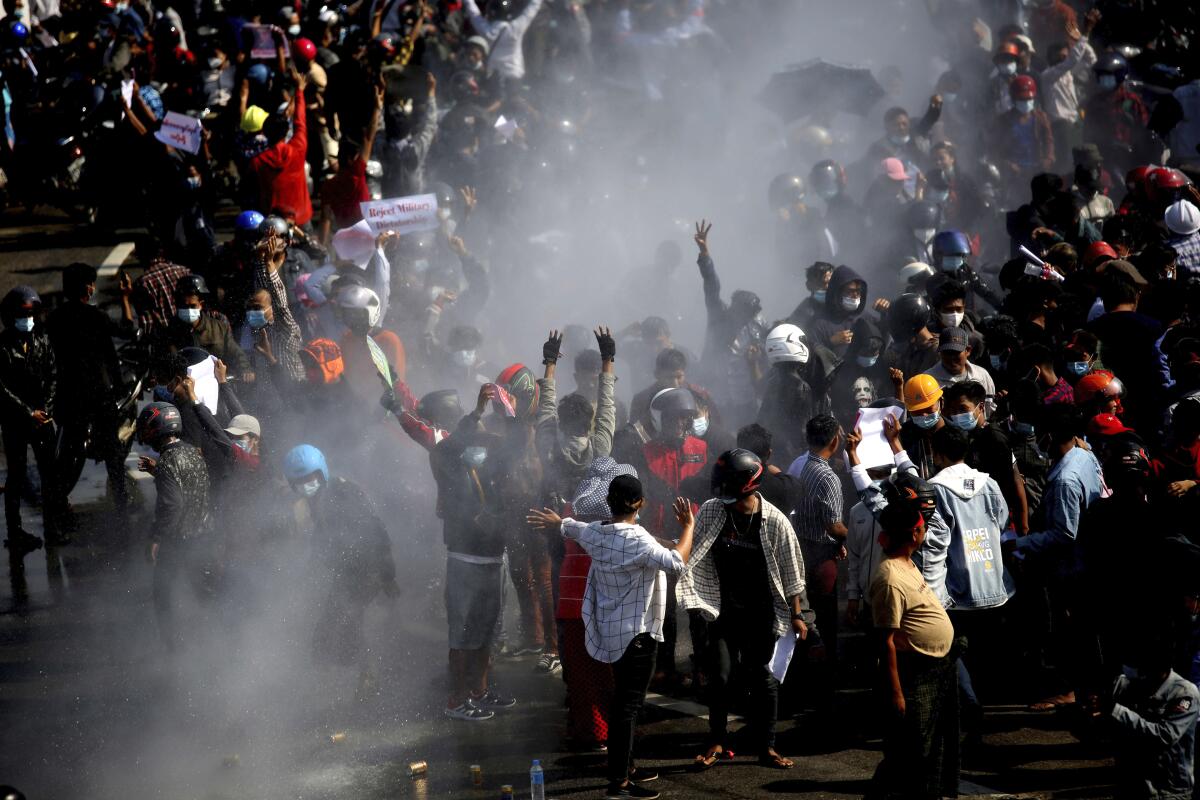Myanmar junta imposes curfew, bans meetings as demonstrations swell

- Share via
YANGON, Myanmar — Myanmar’s new military rulers on Monday signaled their intention to crack down on opponents of their takeover, issuing decrees that effectively banned peaceful public protests in the country’s two biggest cities.
The restrictions were ordered after police fired water cannons at hundreds of protesters in the capital, Naypyitaw, who were demanding the military hand power back to elected officials. It was just one of many demonstrations around the country.
Rallies and gatherings of more than five people, along with motorized processions, were banned, and an 8 p.m.-to-4 a.m. curfew was imposed for areas of Yangon and Mandalay, the country’s first- and second-largest cities, where thousands of people have been demonstrating since Saturday.
Protesters in Yangon rallied Monday at a major downtown intersection, raising three-finger salutes that are symbols of resistance and carrying placards reading, “Reject the military coup” and “Justice for Myanmar.”
There were also demonstrations in towns in the north, southeast and east of the country.
The decrees enabling the new restrictive measures were issued on a township-by-township basis, and were expected to be extended to other areas. They say they were issued in response to people carrying out unlawful actions that harm the rule of law, a reference to the protests.
The growing defiance was striking in a country where past demonstrations have been met with deadly force. That resistance was happening in Naypyitaw, whose population includes many civil servants and their families, spoke to the level of anger among people who had begun to taste democracy only in recent years after five decades of military rule.
“We do not want the military junta,” said Daw Moe, a protester in Yangon. “We never ever wanted this junta. Nobody wants it. All the people are ready to fight them.”
The coup came the day newly elected lawmakers were supposed to take their seats in Parliament after November elections. The generals have said that vote was marred by fraud — though the country’s election commission has dismissed that claim.
State media for the first time on Monday made reference to the protests, saying they were endangering the country’s stability.
“Democracy can be destroyed if there is no discipline,” declared a statement from the Ministry of Information, read on state television station MRTV. “We will have to take legal actions to prevent acts that are violating state stability, public safety and the rule of law.”
However, the military commander who led the coup and is now Myanmar’s leader made no mention of the unrest in a 20-minute televised speech Monday night, his first to the public since the takeover.
Senior Gen. Min Aung Hlaing instead repeated the claims about voting fraud that have been the justification for the military’s takeover, allegations that were refuted by the state election commission. He added that his junta would hold new elections as promised in a year and hand over power to the winners, and explained the junta’s intended policies for COVID-19 control and the economy.
More to Read
Sign up for Essential California
The most important California stories and recommendations in your inbox every morning.
You may occasionally receive promotional content from the Los Angeles Times.










